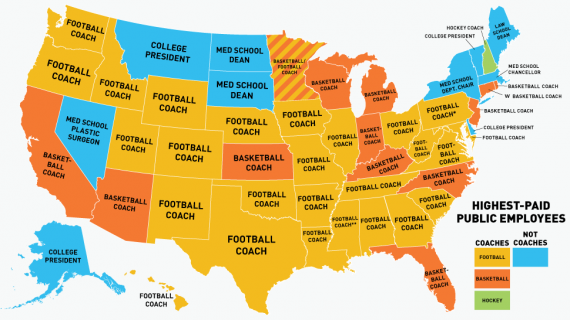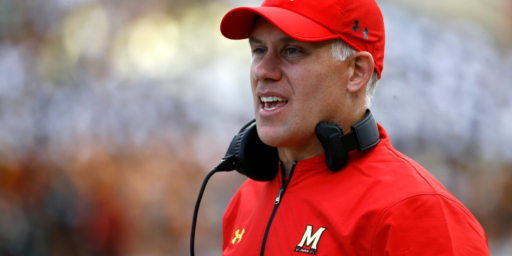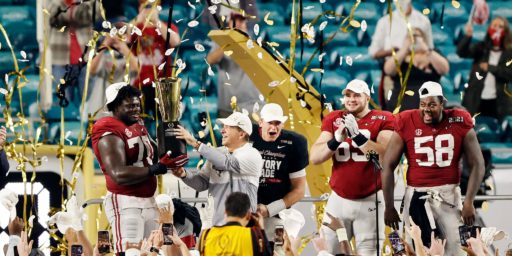Your State’s Highest Paid Public Employee Is Probably A Coach
The odds are that the highest paid public employee is either a football or basketball coach:
You may have heard that the highest-paid employee in each state is usually the football coach at the largest state school. This is actually a gross mischaracterization: Sometimes it is the basketball coach.
Based on data drawn from media reports and state salary databases, the ranks of the highest-paid active public employees include 27 football coaches, 13 basketball coaches, one hockey coach, and 10 dorks who aren’t even in charge of a team.
As the article goes on to note, of course, in most cases those high-priced coaching salaries are paid out of the revenue generated by the school’s athletic program rather than tax dollars. Nonetheless, it does say something about what society actually values, doesn’t it?







I remember something about bread (food stamps) and circuses….
Meanwhile, the Dolphins are threatening to leave Miami after they couldn’t get public-financing for their new stadium.
Not sure this is a reflection of what society values so much as it is a testament to how f’d up the business of sport has become.
The problem I have with this annual revelation is that it’s not true. That is, the football coach making millions a year isn’t getting it out of the taxpayer coffers but from massive athletic department budgets funded by TV deals, ticket sales, alumni contributions, etc. Nick Sabin pulls in $5 million or more a year but it’s not coming from Alabama’s taxpayers.
What is amazing is that Deadspin once again comes up with a story using really nothing more than publicly available data that one can find using Google. ESPN, Yahoo Sports, Sports Illustrated, Fox Sports, etc could have written this story but a bunch of bloggers who seem not that interested in sports are the ones to break the story.
The two youngest reporters to ever win a Pulitzer wrote about college sports. Yet the sports media is dominated by jock sniffers who can barely bother to cover the contracts, the financing, the deals, and the impacts of sports.
@superdestroyer: You are correct to some extent but I think some of the best writing in North American English has come from sports writers because they have to make something that really does not matter seem important. Also, if you want to read some good non-sniffers try Charlie Pierce and Mike Lupica. You may not agree with them but they really know how to write.
I’m far more interested in what it says about what Nevada values. 😉
@superdestroyer: The most important sports media organization – ESPN – is the quintessential jock-sniffing outfit. Oh, they run 30/30 which is occasionally worthwhile, but just as often it includes stuff like a special on how disappointed DanMarino was when he was drafted 26th in the first round of the draft back 1981. ESPN is quite often an embarrassment.
@al-Ameda:
ESPN has a huge conflict of interest. They make their money by broadcasting sports and have an interest in promoting the product. Thus, ESPN promotes their own products. However, ESPN was really an embarrassment by avoiding certain issues and sugar coating others. Two years ago when several newspapers reported on graduation rates at Division I football programs, ESPN ignored the issue. Look at how ESPN refuses to talk much about the O’Bannon lawsuit versus the NCAA and the universities.
I don’t think so. If you look at the total spending, the universities are spending far more on professors and admin than they are on athletics. And state are spending WAY more on social programs, law enforcement and others. It just so happens that, with athletics, the money is concentrated into a very small number of hands.
I’m in academia and we’ve been squeezed (from both state levels and from federal grants). But coaching salaries aren’t the origin of that.
@James Joyner: The coach’s salary may not come from taxpayer funds, but what about the private planes, free cars & tuition & room & board for players, nearly unlimited capital budgets for everything from buildings to computers, and other “rock-star” treatments?
College sports is way out of control – and it is to the detriment of the academic programs who gather the scraps from under the athletic program’s table. Academics are ostensibly the main purpose of a university — why doesn’t the budget reflect this reality? Oh, and what good does it do for a football program to bring in money if it just goes to the athletic program? It’s like running for Senate and realizing you can’t do anything because you need to run for re-election.
When I was in college (just finished – I spent several years as a non-traditional student evenings/weekends) I got a letter from the university president exactly one time. You see, the football coach had retired and they were searching for a new one – he wanted us all to know this important decision was being carefully considered.
I responded to tell him that I hoped as much consideration was going to the decision about who was to head up the English department. There was no response.
@Tony W:
At most universities, the athletic department functions as a separate not-for-profit corporation from the university. At state universities, no tax dollars go to cover operating costs for the athletic department. However, at most universities, the athletic department does receive part of student fees and does get some support out of the overhead of the university.
What really loses money is not the football team or the men’s basketball team but it is the non-revenue sports that employee coaches, staff, and has some scholarships to pay for but with no real revenue to fund them. Even a school with no student support like Memphis or Temple can sell a football loss for $500K or more. However, the big school baseball or softball teams get no ticket revenue, no endorsements, and no money for road games.
The one to two million that the womens basketball team loses is more than the money spent on luxuries for the football team.
It’s the whole profiting off the labor and image of people that can’t earn money in said system that annoys me. Too much money in college athletics to truly justify this idea that tuition/room and board is somehow adequate compensation to generate millions of dollars for other people.
@Console:
If you think that paying the athletes is a solution, are you willing to tolerate college athletics of maybe 50 schools where the athletic department would be football, basketball and enough womens teams to allow compliance with Title IX.
Are you willing to give up March Madness, the college world series, the Frozen Four, etc in order for football players at the BCS schools to get paid?
@superdestroyer:
I’d mostly be fine with the NBA and NFL losing their age restrictions and the NCAA getting rid of lots of rules on compensation and eligibility. I don’t mind the MLB or NHL because they don’t force kids into using the NCAA system as a free labor form of farming prospects. Salaries for college athletes aren’t the only way of making this system fair. Just something as little as allowing players to profit off their own image (selling autographs, making commercials) should be allowed.
And yes, I’m willing to give up a lot for the sake of fairness.
Even if he’s not being paid out of taxpayer money, a coach’s multi-million dollar salary creates an odd situation in which he’s far outearning his bosses – the athletic director, the university president, and ultimately the governor.
About the only analogous situation in the private sector that comes to mind is a star of a hit TV show who outearns the network CEO.